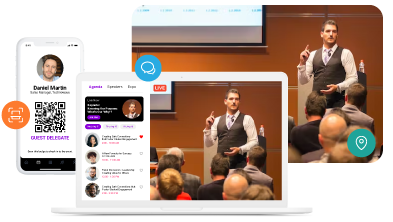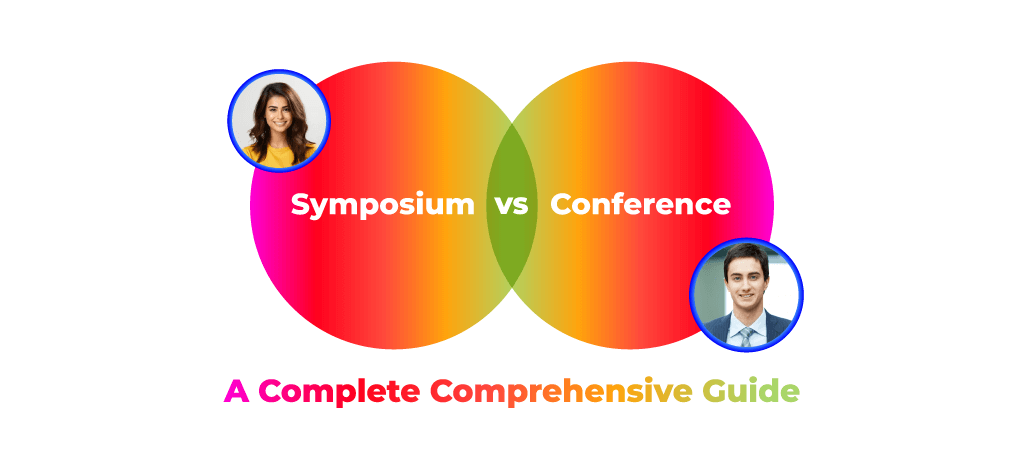Attending events like symposiums and conferences plays an important role and is great for professional development and knowledge sharing. However, these events are often confused with each other, as they share some similar characteristics. Understanding the difference between the two is essential to making informed decisions about which event aligns better with your goals and objectives.
Moreover, deciding between your next conference or symposium to your next in-person or virtual event can be a bit confusing. Both of them can set the stage for an engaging and successful event. In this comprehensive guide, we will delve into the difference between symposium vs conference and understand them better to help you make the right choice for your next event.
What is a Conference?
A conference is a formal gathering of individuals who share a common interest or profession. These events bring them together to discuss, share knowledge, and engage in collaborative learning opportunities. Conferences are organized around a specific theme, topic, and type, providing a platform for researchers, professionals, and experts to present and share their valuable insights. Moreover, conferences can also be organized for professional purposes, and they can take place for multiple days. They feature keynote speakers, presentations, panel discussions, and workshops or tutorials.
What is a Symposium?
A symposium is similar to a conference as they are also a gathering of individuals with a common focus. However, they tend to be more specialized and focused than a conference. Symposiums are often smaller in scale, they emphasize in-depth discussions and interactions among attendees. The format of these events may include short presentations, roundtable discussions, and Q&A sessions. Moreover, symposiums are conducive to exploring a particular topic from different perspectives and foster a more intimate and collaborative environment for attendees.
Differences Between Symposium vs Conference
Conference events and symposiums might share some common characteristics, but they might be different from each other if you look at the differences and how they work. Understanding them is crucial to make better decisions and choices for hosting your event. While the process of event registration and ticketing remains crucial and similar for both these events here are some differences that should be looked into:
Scale and Focus
- Conference: Conferences are characterized by their inclusivity and attract a large number of audiences. They consist of a broad array of topics within a specific field or theme and accommodate a diverse array of interests. Attendees can experience a wide variety of perspectives and areas during a conference.
- Symposium: In contrast, symposiums are more intimate gatherings and are limited in size to foster a focused atmosphere for attendees. These events concentrate on a specific subject or aspect, allowing for a deep dive into discussions among a smaller group of experts.
Format and Structure
- Conference: The format of a conference is designed to accommodate the diversity of topics it covers. The event includes keynote speakers, parallel sessions to cover different subjects, and a variety of presentation formats such as lectures, workshops, and panel discussions.
- Symposium: On the other hand, these events are structured to encourage focused discussions and in-depth exploration of a particular subject. They often feature roundtable sessions where attendees can engage in conversations, fostering a more collaborative and interactive experience.
Audience Interaction
- Conference: Networking is a key aspect of conferences, facilitated through different mediums. Social events, exhibitions showcasing products or research, and parallel sessions where attendees can connect with like-minded individuals contribute to a great networking experience.
- Symposium: These events are a place for premium, intimate interactions. Attendees are encouraged to engage in deeper discussions and collaborations due to their smaller scale to foster meaningful connections.
Purpose
- Conference: Conferences provide a comprehensive overview of the topic, field, or theme. They aim to cover a wide range of topics, and offer a platform for networking and showcasing the diversity of perspectives within a particular industry.
- Symposium: Whereas, symposiums are focused approaches, designed for a specific topic or theme. They provide in-depth analysis, collaboration, and knowledge sharing among experts in, facilitating a more specialized and detailed exploration.
Duration
- Conference: Conferences can be held for multiple days, and allows ample time for exploration of various topics, networking opportunities, and engagement through diverse sessions.
- Symposium: Symposiums are often more concise in time duration, they concentrate on intensive discussions and presentations within a specific timeframe.
Scope of Presentations
- Conference: Conferences provide multiple presentation formats, including research papers, workshops, and panel discussions. This diversity allows for a comprehensive presentation of multiple topics and ideas, giving organizers an array of options.
- Symposium: Symposiums primarily focus on research presentations, expert talks, and in-depth discussions. This narrower scope ensures a concentrated exploration of the specific subject matter at hand.
Tips for networking opportunities during conferences and symposiums
Both these events are great for networking, and it is the best way to make connections on a professional and personal level. In order to create successful engaging networking sessions, here are some tips that you can keep in mind:
Utilize Networking Apps
Leveraging conference event apps is an efficient way to enhance networking. Beyond basic connections, these apps include features such as personalized schedules, chats, and virtual business card exchanges, providing a comprehensive tool for maximizing your networking potential.
Attend Workshops and Tutorials
Organizing workshops and tutorials offers a hands-on and interactive experience. Allow attendees and organizers to participate in practical exercises, share insights, and take advantage of the smaller group. This creates meaningful connections with those who share similar interests or professional goals.
Connect on Social Media
Extend your networking efforts by allowing attendees to actively participate in conference-related discussions on social media platforms. Leverage designated hashtags for engaging conversations, share your experiences, and connect with attendees before, during, and after the event. Social media serves as a powerful tool for your event networking strategy, fostering a broader community beyond the physical space.
Organized Networking Breaks
Structured networking breaks during symposiums and conferences provide valuable opportunities to meet and connect with attendees in a more relaxed environment. Networking breaks allow attendees with a proactive mindset, to initiate conversations and exchange contact information. These breaks are designed to encourage interaction, so make sure that you give them the most of the designated time.
Host a Discussion Table
Consider hosting a discussion table during conferences and symposiums. This gives attendees a reason to show interest in your expertise or topic. By initiating and leading discussions, you not only share your knowledge but also attract like-minded attendees for meaningful networking.
Collaborative Workshops
Organizing workshops is a great idea that fosters connections in an engaging setting. Whether through activities or group projects, these workshops create a shared experience that strengthens professional connections. Actively contribute, seek input from others, and use these opportunities to establish connections with attendees.
Seek Out Speakers and Keynotes
Symposium and conference speakers and keynotes are often popular figures in their respective fields. Collaborate with them and express your appreciation, ask questions, and share thoughts to build a connection. These experts can open doors for further discussions, mentorship opportunities, and valuable insights.
Leverage Online Platforms
Virtual events are a great way to engage a wider audience, online event platforms play a crucial role in networking as they are integrated with robust features. Engage your audience in chats, live streams, discussion forums, and explore virtual networking lounges. These offer digital networking opportunities to attendees similar to in-person conferences.
Final thoughts
Symposiums and conferences both are similar in some ways, as they share some similarities. However, it is important to understand the differences between these two event formats for better understanding. Even though they are similar, conferences are large-scale events that occur for multiple days while symposiums are small-scale events with definite time period. Dreamcast can provide you with robust conference and symposium registration, management, and a virtual hosting platform suitable for your event needs. Book a demo now to learn more!
Create an Extraordinary Event Experience
Across All Event Formats




















